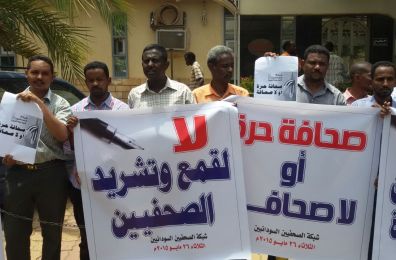Sudanese security confiscates copies of a newspaper over cartoon
September 20, 2015 (KHARTOUM) – Sudan’s National Intelligence and Security Services (NISS) on Sunday has seized print runs of Al-Khartoum daily newspaper.

It is worth mentioning that NISS has carried out a confiscation campaign against the newspapers since last Friday despite the promises made by the dialogue body known as 7+7 to take measures to create conducive climate including stopping arrests, lifting of censorship on newspapers and allowing public and personal freedoms.
NISS has seized copies of Al-Sudani newspaper on Friday and Saturday from the printing house for publishing a report on water pollution and a series of columns by the newspaper’s chief-editor criticizing the arrest of the female journalist, Hiba Abdel-Azeem who made the report.
However, the confiscation of the print runs of Al-Khartoum newspaper represents a rare precedent because it was likely due to publishing a cartoon in the front page.
The caricature depicts the NCP in the form of a man struggling to reach the dialogue which was drawn in the form of a woman and saying “I love dialogues to death”.
Cartoonist Hashim Karouri who draw the caricature told Sudan Tribune that he meant to send a message saying that the ongoing dialogue is futile because it is fully controlled by the ruling National Congress Party (NCP).
He said that the Al-Khartoum has adopted a new editorial policy allowing cartoons to appear in the front page which is considered a rare move in Sudan’s local newspapers.
Al-Karouri added that he doesn’t belong to any political party, saying he takes the side of the Sudanese people who suffer from the spiraling cost of living and the differences among politicians.
He demanded the government to magnanimously accept the free criticism, saying “we don’t mean to offend anybody but we speak a language understandable to the ordinary citizens”.
Sudan’s constitution guarantees freedom of expression but laws subordinate to the constitution such as the National Security Forces Act of 2010 contains articles that can be potentially used to curtail press freedom and instigate legal proceedings against newspapers and individual journalists.
Sudanese journalists work under tight daily censorship controls exercised by the NISS.
Journalists say that NISS uses seizures of print copies of newspapers, not only to censor the media but also to weaken them economically.
